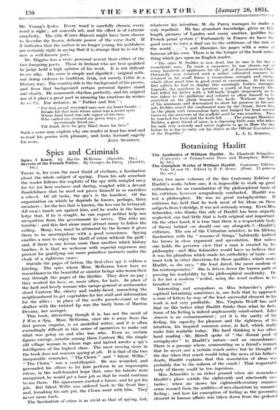Spies and Criminals THERE is, for even the most timid
of civilians, a fascination about the whole subject of spying. From his safe armchair the reader follows the exploits of the spy with mingled envy for his (or her) coolness and daring,-coupled with a devout thankfulness that he need not prove -himself in so merciless
a school. Of all tasks, the spy's is the loneliest. Of the organization on which he depends he knows, perhaps, three members : for the less that is known, the less can be betrayed.
All men's hands are against him, and he works in the know- ledge that, if he is caught, he can expect neither help nor reCognitiori from the government he serves. The risks are terrible : and this fact alone must attract many to follow the calling. Many, too, must be attracted by the licence it gives them to be unscrupulous with a good conscience. Spying enables a man to enjoy the thrill of crime without the guilt : and, if there is one lesson more than another which history teaches, it is that we welcome with especial eagerness any pretext for gratifying our more primitive in.stincts under the cloak of a righteous cause. Outside the pages of fiction, the first-class spy is Seldom a hireling. The spies whom Mme. McKenna knew bore no resemblance to the beautiful or sinister beings who worm their way through the pages of the thriller. They drew no pay ; they worked for love, or, more often, for hate. In place of the dark and lovely woman who vamps general or ambassador stood Canteen Ma, cheery and ruddy-faced, ransacking the neighbourhood to get vegetables for her stall and information for the allies : in place of the svelte pseudo-count or the skulker with the twisted lip was the burly form of Manton Devany, her avenger. This book, interesting though it is, has not the merit of 1 Was a Spy. Mme. McKenna, once she is away from the first person singular, is an unskilful writer, and it is often exceedingly difficult in this series of narratives to make out -what was going on and who was who. Even so, certain figures emerge, notable among them Canteen Ma, the simple old village woman in whom rage and hatred awoke a spy's intelligence of the highest class. The most moving story in the book does not concern spying at all. It is that of the two
inseparable comrades, " The -Clown " and " Silent Willie.".
" The Clown " was a ventriloquist. He was wounded, and persuaded his officer to let him perform in an impromptu`
circus, in the well-founded hope that, once. his talents were: recognized, he would get a base job so that he could continue to use them. His appearance excited a furore, and he got his job. But Silent Willie was ordered back to the front line ; and, forsaking his safe job, the Clown went with hith. The never came back. .
The fascination of crime is as vivid as that of spying, but,'
whatever his intention, M. du Parcq manages to make it only repellent. He has abundant knowledge, gives us. full- length pictures of Landru and many another, justifies French penal system (" Fortunately in France we have the good-sense to turn a deaf ear to the -criticisms of the rest of the world- . . . "). and illumines his pages with a sense of humour all his own. There is in the temper of the book some- thing which'jars upon an English reader.
" The elder M. Deibler is now dead, but he was in his day a remarkable man. By trade a carpenter, he was chosen out of many hundreds of applicants for the job. of Executioner-in-Chief. Outwardly very reserved with a rather cultivated- manner, bo retained in his small frame a tremendous strength and energy which often stood him in good stead at executions. At hifi very first affairs he had to display this amazingly hidden strength. Laprade,. the muixlerer in question, a youth of but twenty who had killed his -father with a bill-hook,` fought desperately as ht, was taken to the guillotine and refused to allow himself to hu stretched on the plank beneath the knife. Without the help Of his -assistants and determined to show his prowess at his new job, Daibler seized the condemned man by the throat, threw hint on the plank with tremendous force and banged his head-several times on the structure of the scaffold until he was senseless. Then• he touched the lever and the knife-fell. . . .. The younger MonsieurDeibler, a great friend of mine, is a -charming little man who takes
his task very seriously and never neglects to go to Maas -the day before he is due to carry out his duties as the Official Executioner of the Republic." L. A. G. STRONG.










































 Previous page
Previous page